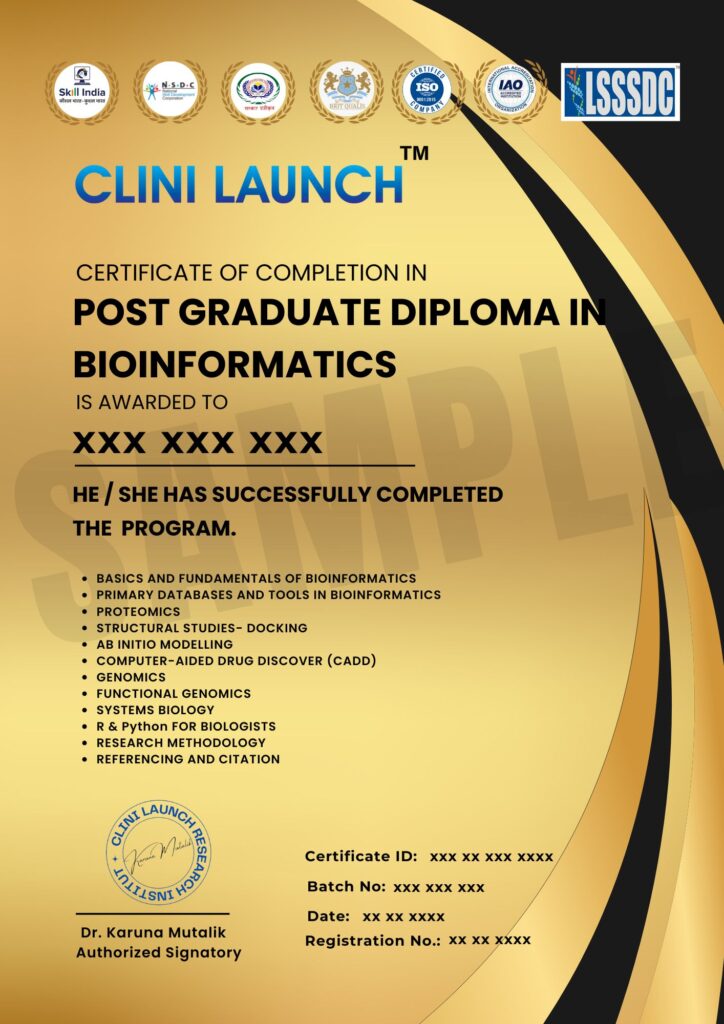Bioinformatics in Bangalore
In the era where biological data is exploding, the demand for skilled professionals who can interpret and leverage this information is higher than ever. Bangalore, a burgeoning hub for biotechnology and IT, offers a dynamic environment for aspiring bioinformaticians to develop their expertise.
- 100% Placement Assistance
- Comprehensive Curriculum
- Hand-on Practical Training
- Online or Offline Sessions
Dive in to discover the curriculum highlights, practical training sessions, career prospects, and leading institutes that make Bangalore an ideal destination.
Live Online Classes starting on 8th, 15th, 22nd & 30th.
Book Your Free Demo Class Today!
Bioinformatics in Bangalore
- In-depth Industry Insights
- Hands-on Practical Skills
- 100% Placement Assistance
- Real-world Applications
Diploma Courses for Pharma & Biotechnology Professionals
Live Online Classes starting on 8th, 15th, 22nd & 30th.
Book Your Free Demo Class Today!

IAO & NSDC Accredited Courses

IAO & NSDC Accredited Courses

IAO & NSDC Accredited Courses

IAO & NSDC Accredited Courses
Our Courses

PG Diploma In Bioinformatics
Pursue the opportunities in healthcare pharmaceuticals, biotechnology, academia and research institutions. Become a Bioinformatics nerd starting today.

Advanced Diploma In Bioinformatics
Gain in-depth skills in bioinformatics. Bridge the gap between biological data and computational analysis. Become a bioinformatics professional. Start now.
What Sets CliniLaunch Apart

Placement Assistance
Strong network of recruiters from the healthcare, pharmaceutical, and biotechnology industries and offer placement assistance to students.
Industry Expert Trainers
Equip yourself with skills and knowledge under the mentorship of experienced faculties with over 17 years of experience in the field of healthcare research and training.
Learning Management System
Embark on a transformative learning experience with our state-of-the-art Learning Management System!
Non-Technical and Technical Sessions
Go beyond the textbook with a well-rounded foundation balancing essential technical and non-technical skills needed to thrive in healthcare, IT and Pharma.
Job Oriented Programs
Get comprehensive job-oriented programs to empower you with the skills and knowledge you need to succeed in the dynamic and competitive healthcare sector.
Why do Bioinformatics Course in Bangalore?
A bioinformatics course in Bangalore offers a compelling blend of academic rigor and practical exposure, making it an attractive choice for aspiring bioinformaticians. The state hosts reputable institution Clini Launch, which provides comprehensive PG Diploma in Bioinformatics. This course is designed to equip you with essential skills in programming (Python, R), data analysis, and the use of specialized bioinformatics tools, preparing them for the expanding job market in genomics, drug discovery, personalized medicine, and healthcare IT.
Eligibility Criteria

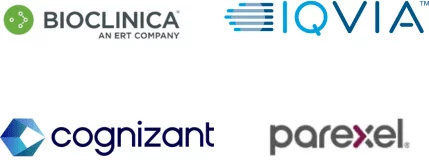
Want to become a Bioinformatics Analyst or Research Scientist?
Best Bioinformatics Course Online Curriculum
Designed by Industry Experts
Bioinformatics Program Program Syllabus
Introduction to Bioinformatics
Explore the fundamentals of bioinformatics, including its history, applications, and role in modern biological research.
Biological Databases and Data Retrieval
Learn how to navigate and utilize various biological databases to retrieve relevant genetic, genomic, and proteomic information for analysis.
Sequence Analysis and Alignment Techniques
Gain proficiency in analyzing biological sequences (DNA, RNA, and protein) and employing alignment algorithms to compare and identify similarities and differences.
Structural Bioinformatics and Protein Modelling
Study the principles of protein structure prediction, molecular modeling techniques, and molecular dynamics simulations to understand protein function and interactions.
Genomics and Transcriptomics Analysis
Dive into the analysis of genomic and transcriptomic data, including genome assembly, gene expression profiling, and variant calling using bioinformatics tools and software.
Metagenomics and Microbiome Analysis
Explore metagenomics approaches for studying microbial communities and analyzing microbiome data to understand their composition, diversity, and functional potential.
Next-Generation Sequencing (NGS) Technologies
Discover the principles and applications of next-generation sequencing technologies, including Illumina, Ion Torrent, and PacBio platforms, and learn data analysis techniques for NGS data.
Phylogenetic and Evolutionary Analysis
Delve into phylogenetic methods for inferring evolutionary relationships among species and analyzing evolutionary patterns using sequence alignment and tree-building algorithms.
Systems Biology and Network Analysis
Explore systems biology concepts and network analysis techniques to model and analyze biological systems at the molecular level, including gene regulatory networks and metabolic pathways.
Machine Learning in Bioinformatics
Understand the application of machine learning algorithms and data mining techniques in bioinformatics research for predictive modeling, pattern recognition, and biomarker discovery.
FREE Career Counselling
We are happy to help you 24/7
A Student’s Journey



Industry-Ready Training
Equip yourself with skills and knowledge required to be successful in the healthcare-pharma or healthcare-IT industry. Enhance your communication and personality.
Certified Courses
Earn credentials through online or in-person programs validating the enhancement of your skills and expertise in the healthcare-IT and pharma sector.
Get Placed
Gain access to volunteer, internship, and placement opportunities and apply real-world applications in healthcare settings like hospitals, CROs, and pharma companies.
What Sets CliniLaunch Apart?
Industry-driven Curriculum
- Gain in-depth Understanding
- Latest Industry Standards
- Up to date Skills and Knowledge
Flexible Learning Options
- Self-Paced Modules
- Live Interactive Sessions
- Online/In-person Classes
Experienced Instructors
- Learn from Seasoned Professionals
- Gain insights into industry best practices
- Dedicated Industry Mentors Available
Career Focused Approach
- Access to our Dedicated Career Services
- Resume Writing Services
- 100% Placement Assistance
Hands-on Learning
- Practical Exercise Integration
- Access to Case Studies
- Live Interactive Sessions
FAQs – Bioinformatics Course in Bangalore
Bioinformatics Course in Bangalore
Yes, Bioinformatics Bangalore is especially recognized for its advancements in areas like genomics analysis, drug discovery informatics, computational biology modeling, and the development of bioinformatics tools and databases.
PG Diploma in Bioinformatics online course
The average duration for a PG Diploma in Bioinformatics online course in India is typically 12 months. The fees can range significantly from as low as ₹7,500 (e.g., NIPPS) upwards of ₹85,000 depending on the institute and its reputation, inclusion of study materials, and level of support.
The specific eligibility criteria for enrolling in a PG Diploma in Bioinformatics online course generally require a bachelor’s degree in a relevant scientific discipline. This usually includes fields such as Biotechnology, Microbiology, Biochemistry, Zoology, Botany, Life Sciences, Computer Science, Mathematics, or Statistics, often with a minimum aggregate score (e.g., 50-60%).
A PG Diploma in Bioinformatics online course is ideal for professionals seeking a career transition as it provides a concentrated and practical skillset in bioinformatics without requiring a full-time, multi-year commitment. It allows individuals from traditional biological or computational backgrounds to acquire the interdisciplinary knowledge needed to enter the growing field of bioinformatics.
In a PG Diploma in Bioinformatics online course, peer interaction and networking opportunities are often facilitated through:
- Online discussion forums and group projects.
- Live virtual classroom sessions that encourage Q&A and collaboration.
- Dedicated communication channels (e.g., Slack, Discord groups) for students.
- Virtual networking events or guest speaker sessions.
- Alumni groups where students can connect with past graduates.
Bioinformatics online course with certificate
When choosing a Bioinformatics online course with certificate for career advancement, look for:
- Reputable issuing institution: University-affiliated courses or those from well-known training providers.
- Comprehensive curriculum: Covering programming, statistics, and core bioinformatics applications.
- Hands-on projects: Demonstrating practical skills on real datasets.
- Instructor expertise: Experienced faculty with relevant industry/research backgrounds.
- Student reviews and success stories.
- Post-completion support: Such as career guidance or alumni networks.
While not all Bioinformatics online courses with certificates offer direct placement assistance like full-time degree programs, many do provide career counseling. This can include resume building workshops, interview preparation, guidance on job search strategies, and sometimes even connections to a network of employers or recruiters. It varies significantly by provider.
Assignments and evaluations in a Bioinformatics online course with certificate are typically structured to assess both theoretical understanding and practical application. This often includes:
- Quizzes and exams on concepts.
- Coding assignments using Python/R for data analysis.
- Project-based submissions where students analyze biological datasets.
- Problem-solving exercises that require applying specific bioinformatics tools.
- Participation in online discussions.
The typical timeframe to complete the coursework and earn a Bioinformatics online certificate varies widely, from a few weeks for introductory modules to 6-9 months for more comprehensive specialized programs. This duration is often flexible in self-paced courses, allowing students to adjust based on their availability.
Healthcare analytics course in India
The scope and career outlook for a healthcare analytics course in India are highly promising. With the increasing digitalization of healthcare data and the emphasis on data-driven decision-making, there’s a growing demand for professionals who can analyze health information. Career paths include Healthcare Data Analyst, Clinical Data Analyst, Health Information Manager, and roles in pharmaceutical companies, hospitals, and public health organizations, with projected job growth.
Common modules covered in a healthcare analytics course in India typically include:
- Introduction to healthcare systems and data.
- Healthcare IT and Electronic Health Records (EHR).
- Biostatistics and statistical modeling.
- Data visualization (Tableau, Power BI).
- Programming for data analysis (Python, R).
- Machine learning in healthcare.
- Healthcare economics and policy.
- Clinical data management.
- Ethical and regulatory aspects (HIPAA, privacy).
The typical fee range for a healthcare analytics course in India, including PG Diplomas, can vary significantly. For government-affiliated institutions, fees might range from INR 8,000 to INR 1.5 Lakh. Private colleges or specialized institutes often charge between INR 80,000 to INR 3.6 Lakh for their PG Diplomas or advanced certificate courses.
While both involve data, a healthcare analytics course in India focuses more broadly on administrative, clinical, and operational data within the healthcare system (e.g., patient records, billing, hospital operations, public health data). A bioinformatics course, on the other hand, specifically deals with biological and molecular data such as DNA, RNA, protein sequences, and gene expression, aiming to understand biological processes at a molecular level.
Bioinformatic institute Bangalore
At a leading Bioinformatic Institute in Bangalore, prominent research specializations often include:
- Genomics and Next-Generation Sequencing (NGS) data analysis.
- Proteomics and mass spectrometry data interpretation.
- Computational drug discovery and molecular modeling.
- Systems biology and network analysis.
- Clinical bioinformatics for personalized medicine.
- Cancer genomics and biomarker discovery.
- Agricultural bioinformatics.
A Bioinformatic Institute in Bangalore contributes significantly to the local biotech and IT ecosystem by:
- Producing skilled professionals who fill roles in research, pharma, and tech companies.
- Engaging in collaborative research projects with industry partners.
- Fostering innovation through startups and technology transfer.
- Hosting seminars and workshops that attract industry experts and researchers, fostering a knowledge-sharing environment.
At a renowned Bioinformatic Institute in Bangalore, students can expect faculty with diverse and deep expertise. This often includes professors holding Ph.D.s from top national and international universities, with strong research publication records, and practical experience in computational biology, genomics, proteomics, machine learning, and specific areas of biological research like cancer or infectious diseases.
At a renowned Bioinformatic Institute in Bangalore, students can expect faculty with diverse and deep expertise. This often includes professors holding Ph.D.s from top national and international universities, with strong research publication records, and practical experience in computational biology, genomics, proteomics, machine learning, and specific areas of biological research like cancer or infectious diseases.
A leading Bioinformatic Institute in Bangalore Clini Launch offer specific student exchange programs or engages in international collaborations, especially for their master’s or Ph.D. programs. These collaborations can involve joint research projects, visiting faculty, or opportunities for students to undertake a part of their studies or research at partner institutions abroad. It’s best to check with individual institutes for such specifics.
CliniLaunch recent placed students
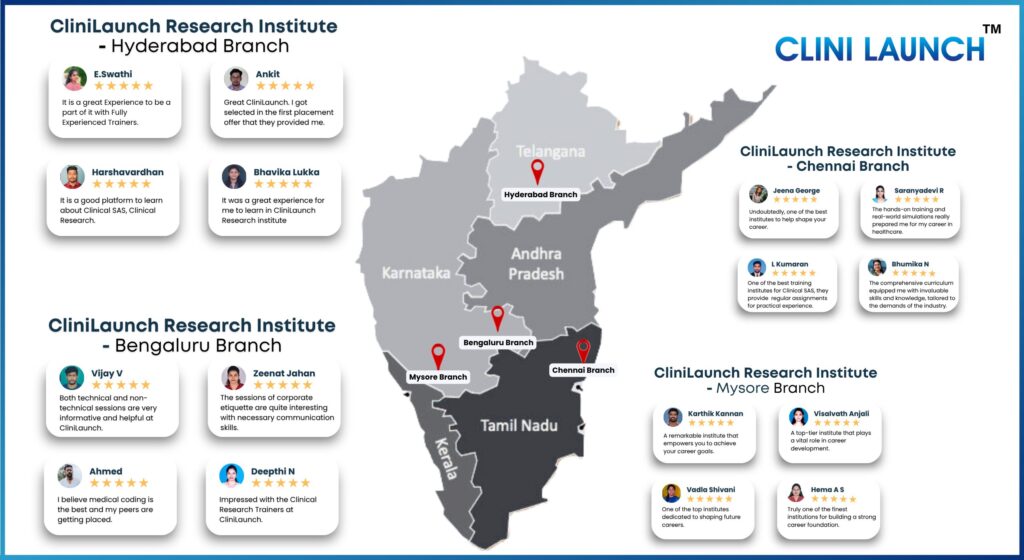













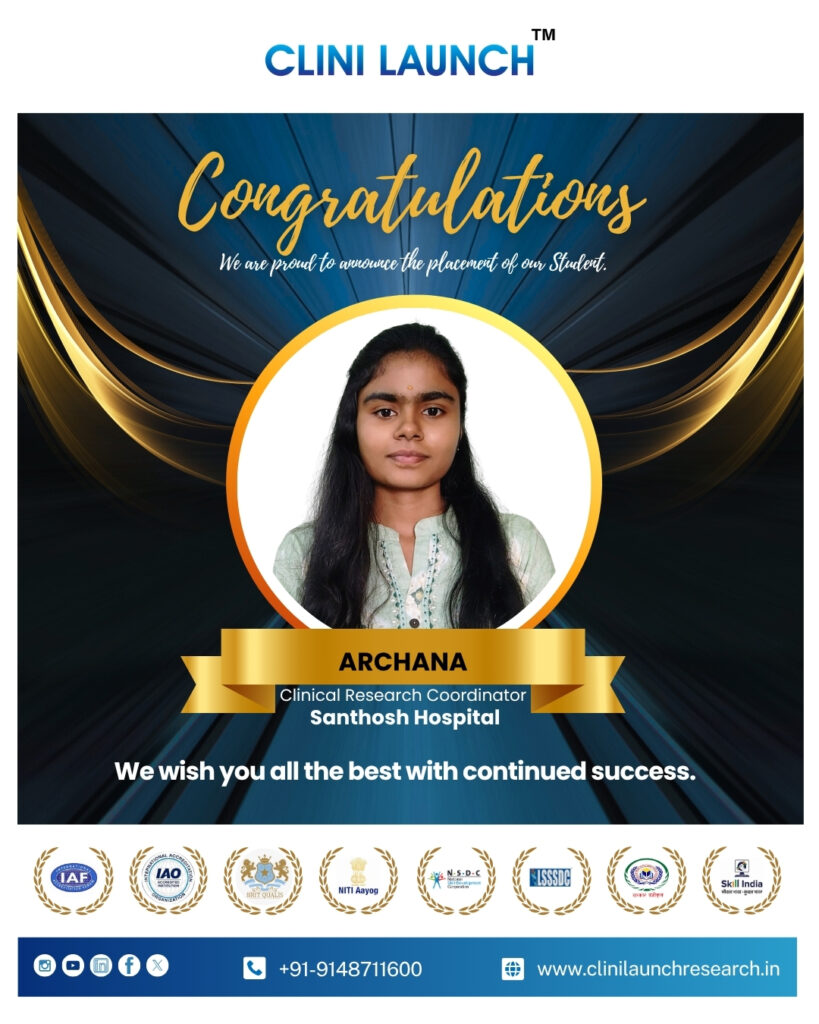
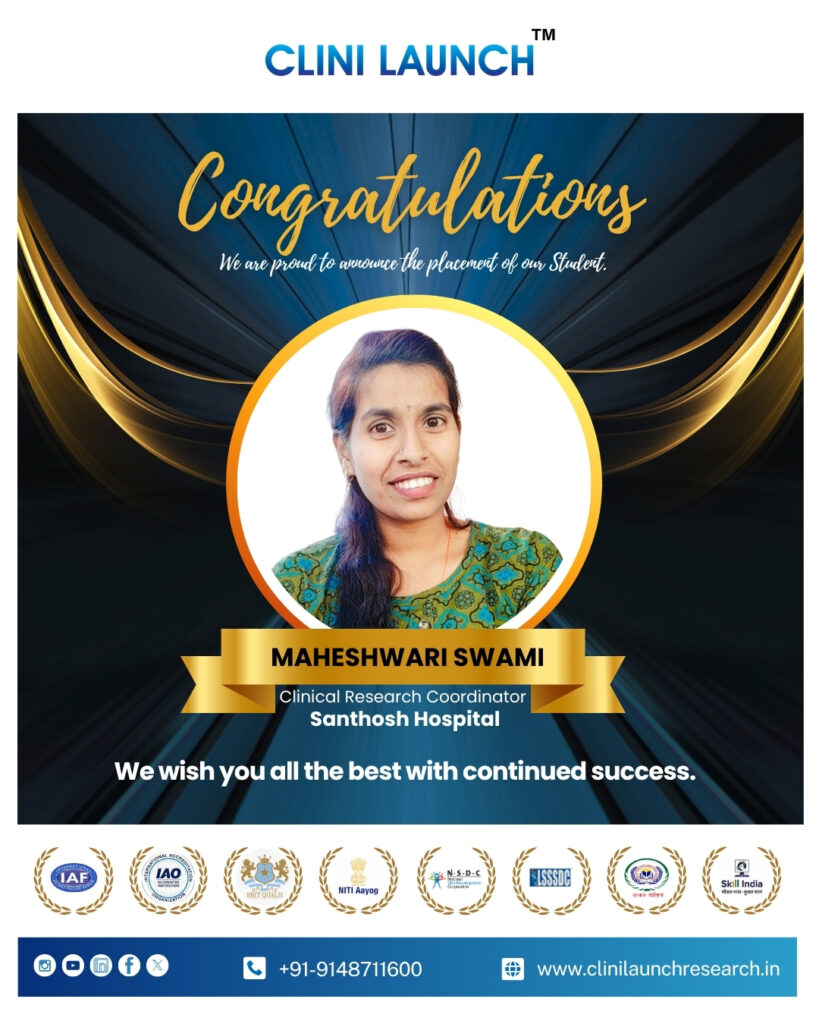
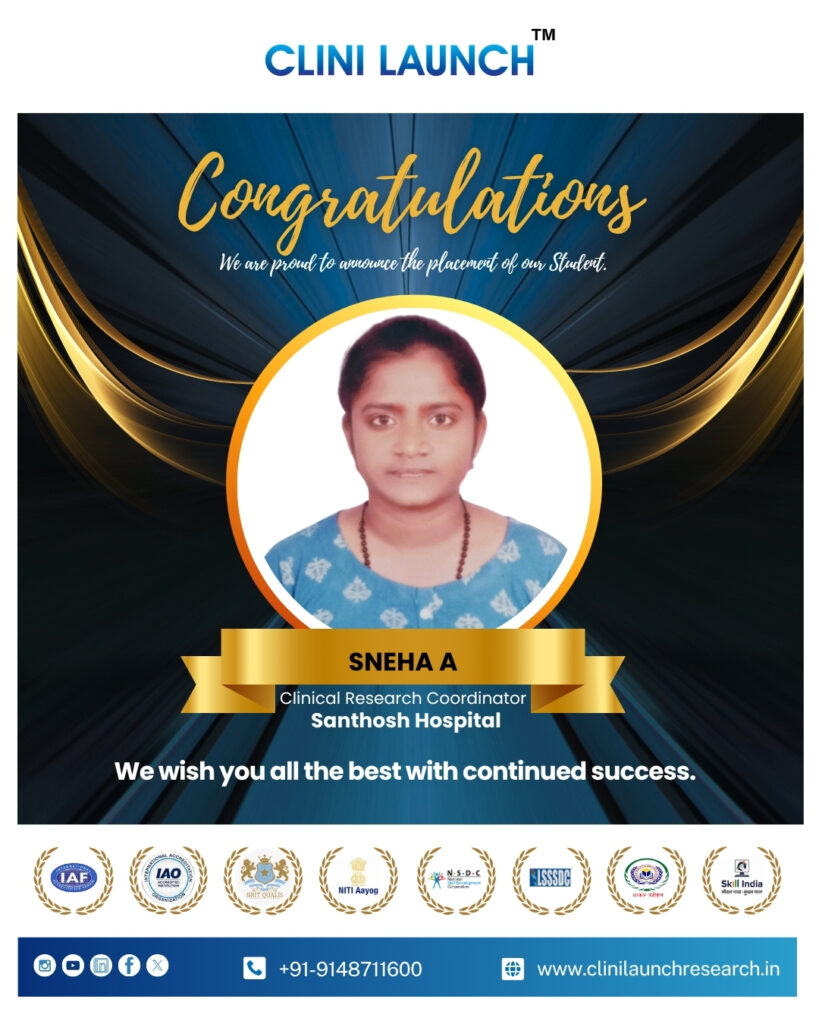

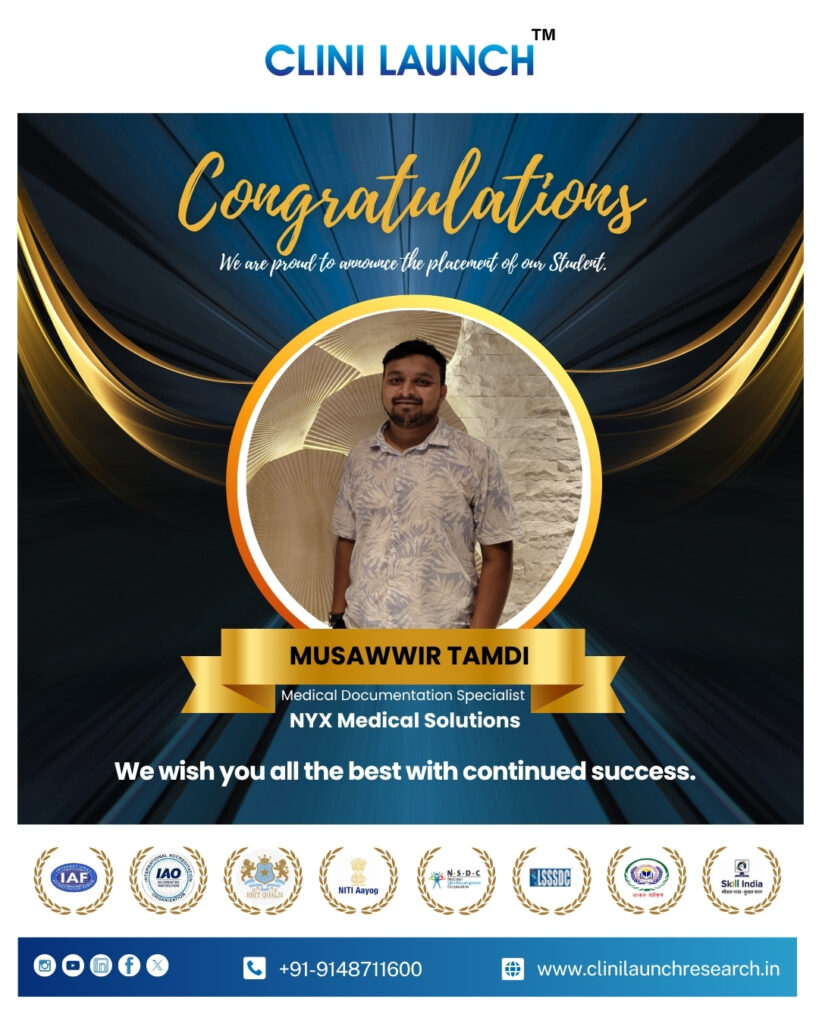

Testimonials
Upskilling does make a difference. Graduates speak out. Hear what our students and professionals are saying about their upskilling journey with Clini Launch.

